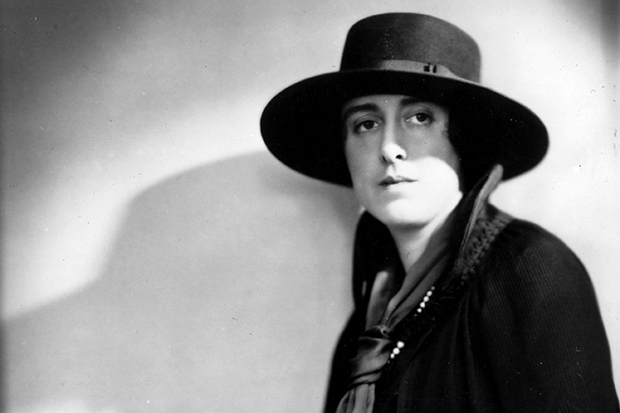In deciding to write a book about her forebears and herself, Juliet Nicolson follows in their footsteps. Given that her grandparents were Harold Nicolson and Vita Sackville-West, and her father was Nigel Nicolson, that they all wrote copiously about themselves, that Knole and Sissinghurst are stuffed with family records, and that she is herself a publisher turned writer, it proved impossible to resist adding her voice to the already substantial record of her family’s powerful social and literary connections.
For a long time she was impressed by something her grandmother’s lover, Virginia Woolf, once said to her father: ‘Nothing has really happened until it is written down.’ She rejects this idea; but by writing her perceptive, self-aware book she herself makes something significant happen. She has not so much joined a family tradition as interrogated it, and in doing so liberated both her female forebears and herself from another family habit: emotional suppression and alcoholic self-destruction.
Some of the stories she relates are familiar, but she tells them with a fresh energy, a delight in vivid detail and the flourish of a romantic novelist. She begins with her great-great-grandmother Pepita, a flamenco dancer with gypsy blood from the ‘throbbing, poverty-riddled’ backstreets of Malaga, who married and left her dancing teacher before becoming the mistress of the 25-year-old diplomat Lionel Sackville-West, heir to Knole, the vast family house in Kent. Spanish women could not then divorce, but the couple travelled and lived together in France and produced five children before Pepita’s death in childbirth in 1871.
One of these illegitimate children became Nicolson’s great-grandmother, Victoria, perhaps the most astonishing of all the women in this saga. In 1881, at the age of 19, she became her father’s companion and hostess at the British Legation in Washington, where her beauty and originality beguiled Henry James and led to a proposal of marriage (one of a dozen or so, she liked to recall) from the new President, Chester Arthur. She declined, and soon after fell in love with her first cousin and her father’s namesake, another Lionel Sackville-West. In 1890 she married him at Knole, where her father had taken her to live, in the chapel where John Donne had often preached. Among their wedding presents were a cloak of Tibetan goat hair from the Chinese minister in Washington and a pearl-and-diamond brooch from the Prince of Wales, the future Edward VII.
At first, the marriage was ecstatic: ‘The newlyweds discovered the best thing about married life, a mutual exhilaration for uninterrupted sex. Victoria could not get enough of it.’ Among the many mementoes Nicolson found hidden away at Sissinghurst (the derelict castle and farm, 25 miles from Knole, bought by her parents in 1930) was a spray of orange blossom once pinned to Victoria’s wedding dress. She writes:
The cupboards and drawers and attics of my life have always been crammed with notebooks, childhood drawings, photographs, paintings, Christmas cards, and all manner of mouldering hats and wedding veils. We seem powerless to resist the urge to make an archive.
But marital bliss does not last long in this family. The birth of her only child, Vita, ruined their sex life. Lionel took up with an opera singer whom he installed at Knole, Vita grew up wilful and lesbian, and Victoria became stout, demanding and eccentric to the point of madness. Much of this territory is well-trodden, though Nicolson adds many effective personal touches to it; but the freshest, bravest and most subversive part of the book concerns her own parents and herself. It is not easy for a child to consider her parents’ unhappy marriage without blame or self-pity, but she manages to do so; her father, Nigel, married because he needed a suitable, docile wife to further his career and give him a family, while her pretty, unintellectual mother, Philippa Tennyson d’Eyncourt, simply wanted to get away from home. Nigel found sex with her daunting and was soon bored by her, and she drifted away to the consolations of other men, house parties in the south of France and, increasingly, drink. Her daughter’s account of all this is painfully honest, as is her admission of how she too turned to the bottle as her own first marriage failed. She recovered, married again, is close to her two daughters and is now very happily a grandmother herself.
In the end, this is a book about how a family survives emotional dramas and difficulties down the generations, and at what cost — especially, though not exclusively, to the women concerned. All the privilege in the world — and the Sackville-Wests and Nicolsons were highly privileged — cannot protect any family from the consequences of emotional and sexual dysfunction. Not long ago such difficulties used not to be spoken, much less written about; Nigel Nicolson himself, in 1974, took one of the first steps in breaking that taboo, with Portrait of a Marriage, in which he published his mother’s account of her lifelong bisexuality. His daughter now takes honesty about family matters much further. In writing this highly entertaining account, she shows exceptional emotional resilience.






Comments